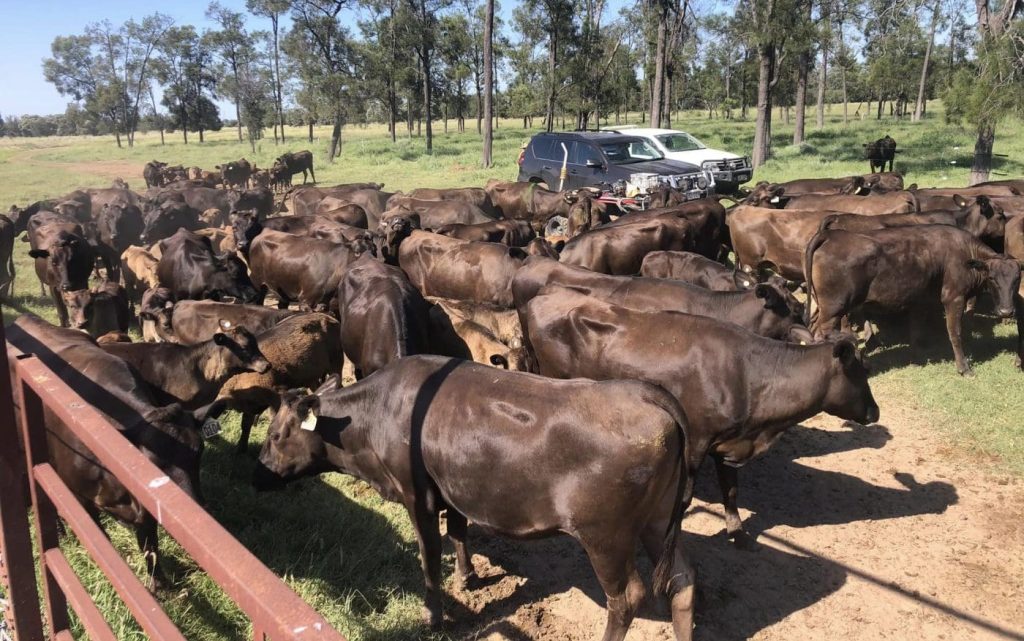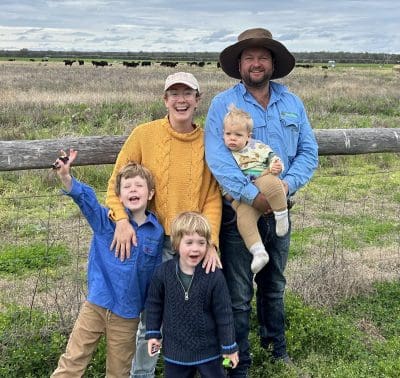
Fullblood cows and calves on Bonyi Grazing, Goondiwindi
A TEAM of Fullblood and purebred steers exhibited by a recent arrival to the Wagyu industry has claimed the overall championship in the 2024 RNA Wagyu Longfed Paddock to Palate Challenge, following revisions to the original standings announced last Thursday.
Technical problems led to a mistake in the calculation of overall winners in the 2024 Brisbane Show competition announced last week.
The RNA has made corrections to the original results after a system error was discovered. The revisions affect only the overall winners in the Wagyu division – all other results are unchanged. RNA Beef Committee chair Gary Noller said an information technology systems error was to blame.
It’s the second time in three months that results from a major carcase competition have been amended, following similar problems during Beef 2024’s National Carcase Competition in early May.
The revised overall champion longfed Wagyu pen was exhibited by the Cranney family, Bonyi Grazing, Goondiwindi.
Todd Cranney said his family were relative newcomers to the Wagyu seedstock industry, having run a commercial Angus herd for many years, using Wagyu bulls over the heifer portion to produce some F1 steers.
When Todd and his brother returned to the family enterprise in 2017, they elected to expand into Wagyu bull breeding, buying a line of Fullblood cows out of the Aus-Spec group dispersal, and using mostly high-performance Trent Bridge Fullblood bulls as the basis for the stud. Genetics advice is provided by breeding consultant Allan Hoey, plus Central Queensland bull breeder Darren Hamblin.
Currently most of the Bonyi Grazing bull turnoff is going to local F1 breeders. The current herd of 350 Fullblood registered breeders will expand to around 700 in coming years.
“As a new bull breeder we felt it was important to get some runs on the board – leading to our entry in the Paddock to Paddock Challenge this year,” Todd Cranney said this morning.
This year’s overall RNA challenge winners were from the first large drop of Fullblood calves produced by the stud.
The Bonyi Grazing entries were solid performers across all of the competition performance categories, covering carcase quality (traits including marbling, marbling fineness and eye muscle area), carcase value, weightgain and beef taste test results.
Where they really shone was in the carcase value division which they topped, producing an average value of $6751 among the seven steers. A number of individual carcases in the Bonyi Grazing group, and a total of 16 scattered throughout all entries, produced carcase values in excess of $7000.

Todd and Alana Cranney on Bonyi with sons, Ned, Mac and Huey.
For the purposes of the Wagyu competition, carcase value was calculated on the basis of hot standard carcase weight x marbling score x grid $/kg.
In the case of the Bonyi Grazing entries, carcase weights after 400 days on feed at Smithfield feedlot’s Sapphire feedlot near Goondiwindi ranged from 400kg to 500kg, averaging 465kg. Camera-generated marbling scores ranged from 8.8 to 12.7, averaging an incredible 9.9.
Consistency is key in Wagyu feeding profitability, and with a ‘low’ marbling score within the Bonyi group of only 8.8, the pen of seven steers exhibited remarkably strong results, from top to bottom.
The steers produced average carcase weights of 465kg, with eye muscle areas averaging 126sq cm, with intramuscular fat averaging 33.6 percent.
Runners up in the overall Wagyu challenge were Fullbloods from Broadwater Downs Pty Ltd, Macquarie Downs Wagyu, Leyburn Qld, with a line of purebreds (97pc) representing Hancock Agriculture, Bell QLD, third.
The individual highest value carcase in the competition, worth $7571, was from a Fullblood pen entered by Selwyn and Jocelyn Maller, Hamilton Park Pastoral Co, Murgon Qld. This body produced a marbling score of 9.1, and exceptional marbling fineness, from a carcase weighing a massive 578kg – the second highest in the competition.
Almost 200 cattle representing Wagyu breeders across Queensland, New South Wales and Tasmania took part in this year’s competition, having been on feed since June last year.
What was clearly evident this year was the number of carcases exceeding 500kg in weight, while still retaining optimum marbling performance.
Sub-categories
With only a few exceptions, entries carrying F2 or more Wagyu genetics featured among the major award winners this year. One of the exceptions to that was in the weightgain section, where heterosis was a factor. F1 Wagyu x Angus pens exhibited by Hamish McIntyre, McIntyre Agriculture St George placed first and third for weightgain, producing average daily gains of 1.2kg and 1.14kg (high roughage Wagyu style ration).
In other sub-categories, this year’s champion individual carcase, based on carcase quality traits was a purebred (94pc) Wagyu, exhibited as part of a team by Poll Wagyu Pty Ltd, Smithton, Tasmania.
This calf produced a 412kg carcase and the highest marbling score in the competition of the equivalent of 15.2, representing an intramuscular fat level of 52pc.
Reserve champion individual carcase came from Hamblin Grazing, Blue Mountain Qld, producing a marbling score of 14.6, and IMF of 50pc. The same carcase won the beef taste test part of the competition, scoring 95.87 points.
